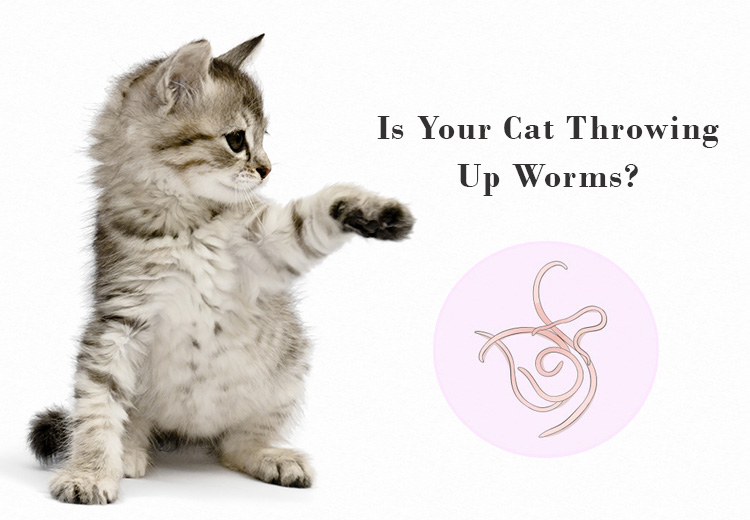Is Your Cat Throwing Up Worms?
Have you seen worms in your cat’s poo or is she throwing up worms, then definitely she has been infected with roundworms. Whenever felines get worms, the biggest challenge is to treat them before the other pets get infected and perhaps even your family.
Roundworms are the most common parasites next to flea and tick that infect dogs as well as cats. Pets can easily get infected from these worms as the roundworm eggs and larvae are found in the following places.
- Feces
- Vomit
- Dirt
- Kitty litter
- A mother’s cat milk
Signs & Treatment for Roundworm Infection in Cats
Normally, felines get infected through numerous ways. The most common is picking it up from their mothers and the others are:
-
Cats can ingest worm ova when they use infested kitty litter and then cleans their paws while grooming.
-
Eating rodents with infested roundworms is another way to get infestation.
-
Biting and ingesting fleas can also lead to roundworm infestations.
Signs of Roundworm Infestation

Roundworms usually stay in intestinal tract of your pet and are generally between three and five inches long. These are very common parasites and they can be identified by their white to cream-colored, thread-like bodies. Along with throwing up the worms, there are other signs that display about the infestation in your kitty.
- Diarrhea
- Sluggish behavior
- Increase in appetite
- Lack of self-grooming
Roundworm Treatment
In lack of treatment, usually pet’s condition deteriorates. Therefore, it is necessary to treat the infestation once it is surfaced. Treating roundworms is not tough. It is as easy as giving your pet a pill. There are numerous medications available that help in treating roundworm infection in cats.
Some of the effective treatments are
How to Dose Your Cat?
For some pet parents, it may be difficult to administer the pill but not impossible. Follow the below steps to give the pill to your cat.
- Hold the cat firmly but not too tightly in your lap.
- Gently tilt her head backwards and open the jaw with your forefinger.
- Place the pill as far back on her tongue as you can.
- Holding her mouth closed, make her head move to the normal position.
- Carefully stroke her throat downward until she swallows.
In case, your pet is fussy about taking the pill, consult your vet for guidelines. For any other instructions about administration of worming tablets, your vet can be of great aid.
Usually, worm infestations take a great toil on the health of felines. Therefore, it is crucial to protect your feline friend from roundworm infection following various preventive measures.
Keep your backyard and lawn clean and free from pet feces.
Do not allow your pet to hunt.
Keep separate litter box for each cat in a household of many cats.
Take your pet for regular health checkups.
Keep your pets and household free from flea infestation.
Follow your veterinarian’s instructions carefully.
Roundworms when not treated in pets can infect humans too and can cause serious side effects. So better, get your cat treated for roundworms whenever you see the signs of infestation.

